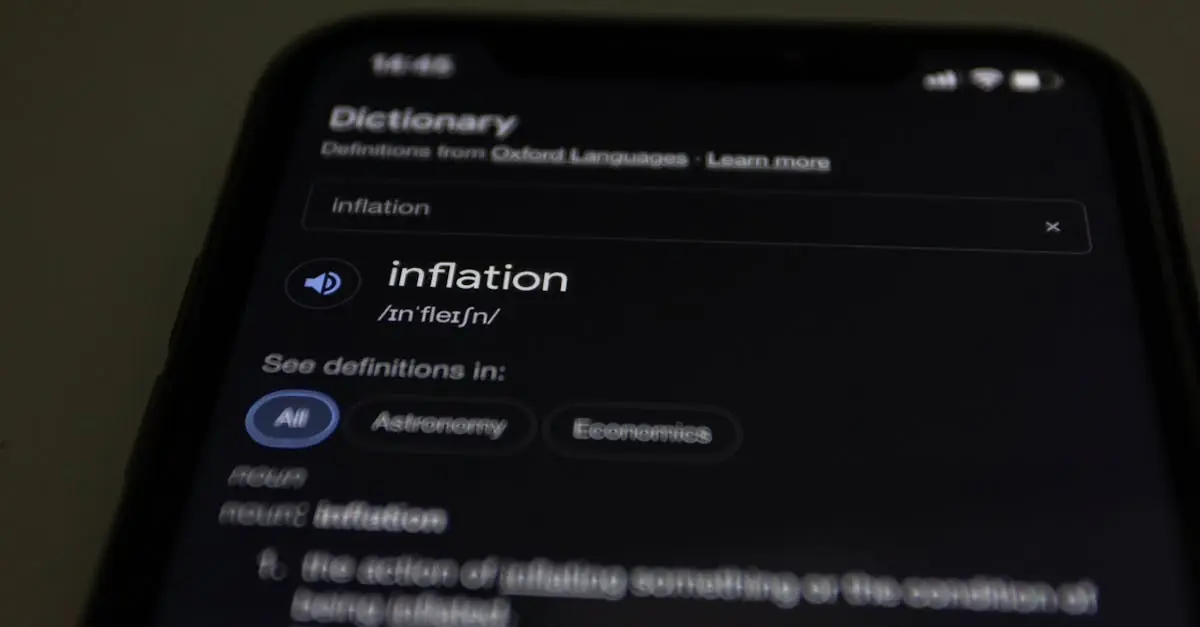In a world where budgeting feels as daunting as solving a Rubik’s Cube blindfolded, personal finance can often seem like a foreign language. But what if there was a fun way to sharpen those financial skills while having a blast? Enter the personal finance word search. It’s not just a game; it’s a delightful brain workout that’ll help anyone master the lingo of money management.
Table of Contents
ToggleOverview of Personal Finance Word Search
Personal finance word search offers an enjoyable method to boost financial literacy. Engaging with these puzzles enhances understanding of crucial money management terms.
What Is Personal Finance Word Search?
Personal finance word search consists of a grid filled with letters where individuals locate specific finance-related terms. Participants search for words such as “budget,” “savings,” and “investment.” Completing these puzzles promotes familiarity with financial vocabulary. They serve as an entertaining approach for individuals to grasp essential concepts in personal finance.
Benefits of Word Search Puzzles in Finance
Engaging with word search puzzles in finance provides numerous advantages. Participants enjoy improved vocabulary related to personal finance topics. As individuals regularly solve these puzzles, they develop enhanced critical thinking skills. Reinforcement of financial terms through repetition aids in retention and understanding. Furthermore, working on these puzzles encourages a fun way to cultivate interest in financial literacy among various age groups.
How to Create a Personal Finance Word Search
Creating a personal finance word search involves thoughtful planning and design. Engaging participants with relevant financial vocabulary enhances their learning experience.
Choosing Relevant Terms
Selecting the right terms is crucial for maximizing educational value. Consider including words like “savings,” “debt,” “investment,” and “interest.” Focus on terms that build a solid foundation in personal finance. Decide based on the audience’s knowledge level; for beginners, use simpler terms. For advanced learners, incorporate jargon specific to financial markets. Ensure the chosen terms cover a broad range of concepts, promoting comprehensive understanding. Include both common and essential vocabulary to boost recall and engagement.
Designing the Puzzle Layout
Designing the layout requires attention to detail and creativity. Start with a grid that accommodates your selected terms. Decide on the puzzle’s dimensions; common sizes include 10×10 or 15×15 grids. Randomly place the terms in various directions, including horizontally, vertically, and diagonally. Use a mix of overlapping words to create challenge and complexity. Fill any empty spaces with random letters, maintaining the letter density. Consider clarity and readability; ensure the font size is appropriate for your audience. Finally, test the puzzle to confirm that all words are discernible and correctly placed.
Tips for Using Personal Finance Word Search
Personal finance word searches provide a fun way to engage with finance concepts. Players develop financial literacy while actively searching for terms.
Engaging Family and Friends
Gathering family and friends for a word search enhances the experience significantly. Participants can compete to find terms like “debt” or “savings” faster. Sharing insights about each word promotes discussion about personal finance topics. Creating a friendly environment encourages teamwork, where players can help one another understand unfamiliar terms. Offering small prizes can motivate participants to engage and learn more deeply.
Educational Benefits for Kids
Kids benefit greatly from personal finance word searches. They encounter essential terms such as “budget” and “investment” in an enjoyable format. Enjoying the game promotes interest in financial literacy at an early age. Parents and educators can use these puzzles as teaching tools to reinforce learning. By discovering words together, children develop critical thinking skills and improve their vocabulary related to money management.
Popular Themes in Personal Finance Word Search
Personal finance word searches often focus on essential themes that enhance financial literacy. Two popular themes include saving and budgeting, along with investing terminology.
Saving and Budgeting
Saving and budgeting are fundamental aspects of personal finance. They typically involve essential terms like “emergency fund,” “fixed expenses,” and “variable expenses.” Engaging with these terms in a word search helps individuals understand how to allocate resources effectively. It fosters familiarity with concepts that are crucial for financial planning. Finding these words also emphasizes the importance of tracking spending behaviors, allowing participants to develop better money management skills over time. Exploring these terms can lead to discussions about personal finance strategies among friends and family.
Investing Terminology
Investing terminology serves as another vital theme in personal finance word searches. Vocabulary such as “equity,” “diversification,” and “portfolio” frequently appears. These terms encapsulate key concepts that support understanding the investment landscape. Familiarity with investing language enhances one’s ability to communicate effectively about financial choices. Recognizing these words encourages individuals to explore investment options and strategies, which is vital for building wealth. Completing a word search with investing terms starts meaningful conversations and promotes a proactive approach toward financial growth.
Personal finance word searches offer a unique and enjoyable way to boost financial literacy. By engaging with this interactive puzzle format, individuals can deepen their understanding of essential financial terms while having fun. The benefits extend beyond vocabulary enhancement; they also promote critical thinking and retention of important concepts.
This activity can easily be adapted for various age groups and knowledge levels. Whether it’s a family game night or a classroom activity, personal finance word searches can spark meaningful conversations about money management. By incorporating these puzzles into learning routines, participants can cultivate a proactive approach to their financial futures, making financial literacy both accessible and enjoyable.




